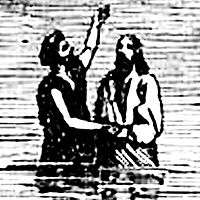Morgan Edwards
Morgan Edwards (May 9, 1722 – January 25, 1795) was a Welsh historian of religion, Baptist pastor, and notable for his teaching on the 'rapture' before its popularization by John Nelson Darby (1800–1882).
| Part of a series on |
| Baptists |
|---|
 |
|
Background |
|
|
Edwards was born in Trevethin parish, Pontypool, Wales, and attended Bristol College, after which he began preaching in 1738. He pastored several small Baptist churches in England for seven years, then moved to Ireland, where he pastored for nine years. In May 1761 he immigrated to the American colonies, and became pastor of the Baptist church in Philadelphia, Pennsylvania. He was one of the few Baptist clergyman to side with the Tories in the American Revolution.[1]
After the war, he became what has been referred to as the premier Baptist historian of his day. He may have been the first American Baptist historian. His major work, Materials Toward A History of the Baptists (1770) is an important source describing the Baptists in America. He later produced a companion volume, Materials Toward A History of the Baptists in New Jersey (1792)
In his Materials for a History of the Baptists in Rhode Island, Edwards wrote: "The first mover [himself] for it [a Baptist college] in 1762 was laughed at as a projector of a thing impracticable. Nay, many of the Baptists themselves discouraged the design (prophesying evil to the churches in case it should take place) from an unhappy prejudice against learning." In 1764, Edwards joined The Reverend James Manning, The Reverend Ezra Stiles, the Reverend Isaac Backus, the Reverend John Gano, the Reverend Samuel Stillman, William Ellery, and former Royal Governors Stephen Hopkins and Samuel Ward among several others as an original fellow or trustee for the chartering of the College in the English Colony of Rhode Island and Providence Plantations (the former name for Brown University), the first Baptist college in the original thirteen colonies and one of the Ivy League universities.
Edwards is notable for his early pretribulationism, predating John Nelson Darby (1800–1882) and popularization of the idea. Pretribulationism is the view that Christian believers will be raptured or translated to heaven with Christ before the events of the tribulation. Edwards taught in 1788:
"The distance between the first and second resurrection will be somewhat more than a thousand years. I say, somewhat more—, because the dead saints will be raised, and the living changed at Christ's "appearing in the air" (I Thes. iv. 17); and this will be about three years and a half before the millennium, as we shall see hereafter: but will he and they abide in the air all that time? No: they will ascend to paradise, or to some one of those many "mansions in the father's house" (John xiv. 2), and disappear during the foresaid period of time. The design of this retreat and disappearing will be to judge the risen and changed saints; for "now the time is come that judgment must begin," and that will be "at the house of God" (I Pet. iv. 17)."[2]
The 70th week of Daniel 9 is often considered to be seven years and popularly called "The Tribulation" by modern Pre-tribulationists. Thus modern Pre-tribulationalists may refer to Morgan Edward's view above as mid-tribulationism, since it puts the Rapture only (about) 3 1/2 years before the Millennium, instead of 7 years. However, for one who limits the "Tribulation" to 3 1/2 years, Morgan Edwards would have a pre-tribulation position.
Sources
- Lindsey, Hal, Vanished Into Thin Air, Western Front, Ltd., 1999, p. 133.
- Ice, Thomas, Pre-Trib Perspectives Articles, http://www.according2prophecy.org/apredarby.html
- Welsh Biography On-line
- Brown University Charter
- Brown University's John Hay Library
References
- ↑ Torbet, Robert (1963). A History of the Baptists. Valley Forge, PA: Judson Press. ISBN 0817000747.
- ↑ The Eighteenth Annual Barndollar Lecture Series: “The History of the Doctrine of the Rapture”. Part I: “A History of Pre-Darby Rapture Advocates”, by Thomas Ice, quoting from Edwards' Two Academical Exercises on the Subjects Bearing the Following Titles; Millennium and Last-Novelties